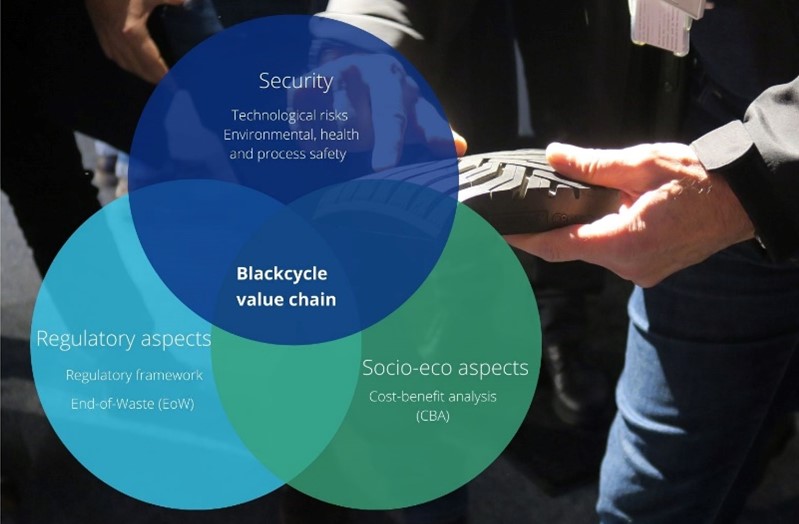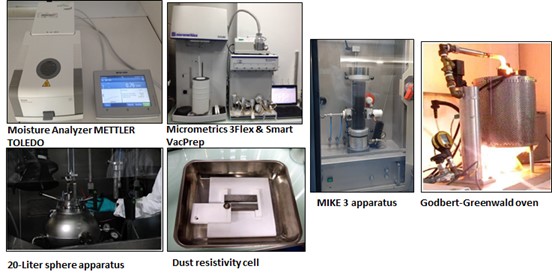Ineris is one of the leading partners of WP9 dealing with ‘Sustainability, techno-economic health and safety assessment’. The role of Ineris in the project is to assess Environmental, Health and Process safety (EHS) potential issues of the Blackcycle value chains and provide support and recommendations for eliminating or mitigating the risks. Ineris is also in charge of the application of the End-of-Waste (EoW) approach and of the analysis of the regulatory status pertaining to the secondary raw materials (SRM) coming from the Blackcyle process and subsequently explores the application of the EoW approach for facilitating the valorization of SRM and their transport. Finally, Ineris will also carry out a cost-benefit analysis (CBA) in order to study the sustainability of the Blackcycle underpinning innovation from an eco.

The work progress achieved by Ineris during the 1st reporting period (M1-M18) can be summarized under 4 distinct actions.
1/ Identification of the applicable regulatory framework for the valorisation of SRM from end-of-life tyres
Ineris has drafted a first deliverable on the regulatory framework applicable for achieving End-of-Waste and made assumptions on how EoW conditions could be fulfilled. In collaboration with the project partners but also with colleagues from other European projects dealing with recycling and producing SRM, a common reflexion has been engaged during one of the worskshop sessions organized in the 1st Blackcyle workshop in November 2021. The goal was to identify the difficulties of implementing the EoW approach, complying with EoW conditions, the optimal stage for applying the EoW and the differences in application between countries.
Regulations related to process safety and to the protection of environment and population (mainly through prevention and reduction of emissions at source) that may be required for the deployment of the processes developed in the Blackcycle project were also reviewed.
2/ Preparation of the cost-benefit analysis (CBA) scenarios for the assessment of the impacts of the Blackcycle value chain as a whole
In order to consider all the impacts (environmental, sanitary and economic) generated by the deployment of the Blackcycle innovation, Ineris with Quantis and ICAMSYL and Michelin and other partners within the WP9 is defining scenarios values chains of tyres for the CBA. At least two scenarios need to be defined: one reference scenario (without Blackcycle) and one Blackcycle (with the Blackcycle innovation). Scenarios need to be defined conjointly with the WP9 partners in order to be able to reuse the results of the other, in particular the LCA impacts.
3/ Methodology development for the Environmental, health and process safety assessment
A stepwise risk assessment methodology was proposed for evaluating the process safety and environmental risks of the Blackcycle value chains. Data collection was started through literature review and questionnaires were made. Onsite visits of the TRL5 and TRL8 facilities at CSIC and SISENER in Zaragoza provided inputs for the EHS assessments. Review of existing literature was performed on tyre pyrolysis process for data on process configurations, emissions and process safety aspects.
Besides, experimental characterization of key materials associated with the Blackcycle value chains was carried out. Phys-chem properties related to material hazards namely the flammability, explosibility, ignition energy, electrostatic risks and reactivity were evaluated for recovered carbon black (rCB) and resins. The results will serve as an input for the risk analysis of the process, comparing of the risk profile of Blackcycle materials with commercial ones, aid in the choice of equipment, consideration of incident/accident scenarios and comparison of process pathways in terms of risks.

Illustration of few experimental facilities at Ineris used in the characterisation of Blackcycle material streams
4/ Dissemination and communication activities
Ineris attended conferences in which the project was presented and the actions of Ineris in Blackcycle project was highlighted. The importance of dealing with risks at the early stages of the process development and the subject of EoW in waste recovery as SRM were presented to different stakeholders. As an example, the project was presented in a webinar on the circular economy on the 9th of July, 2021 organized by the Bio-Environment and Industry (PCNs-National Contact Points), French Ministry of Higher Education, Research and Innovation. Ineris also participated in the symposium and round table on « new interactions at the service of circular strategies », organized by ANRT (French national research organization) and INSA Lyon, on December 2, 2021.
Few words about Ineris: Managing Industrial and Environmental Risks
Created in 1990, the Institute’s mission is to contribute to the prevention of risks caused by economic activities to health, environment, and the safety of people and goods. It conducts research programs with the aim of improving our understanding of the phenomena that are likely to lead to risk situations or damage to health and the environment, and of further developing its expertise in prevention. It works to expand its scientific and technical capabilities in the fields of accidental risk, chronic risk, and ground-level / subterranean risks (mining), and makes them available to public authorities, local authorities, and businesses to help them make the decisions best suited to improving environmental safety.
